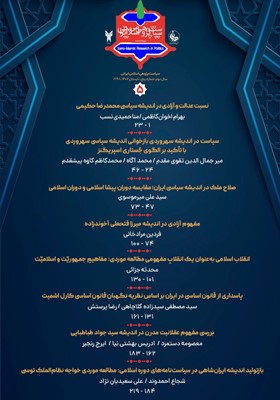صلاح ملک در اندیشه سیاسی ایران؛ مقایسه دوران پیشا اسلامی و دوران اسلامی
محورهای موضوعی : تاریخِ اندیشه سیاسی در ایران
1 - گروه علوم سیاسی،دانشگاه مفید، قم، ایران
کلید واژه: صلاح ملک, مصلحت, ایرانشهر, اندیشه سیاسی, اسلام, ایران,
چکیده مقاله :
مفهوم مصلحت از مفاهیم با اهمیت و پر کاربرد در تاریخ اندیشه سیاسی است. با نگاهی به میراث سیاسی بر جای مانده از ایران باستان و مقایسه آن با آثار دوران اسلامی می توان دریافت صلاح ملک مفهومی کانونی در اندیشه سیاسی ایران بوده است. در دوران ایران شهری، رعایت مصالح ملک و مردم از ویژگی های شاهی نیک و آرمانی بوده و به عنوان معیاری برای تمایز نظام سیاسی مطلوب از نامطلوب به کار می رفته است. در دوران اسلامی نیز با ترجمه آثار ایرانی، این مفهوم در سیاستنامه ها بازتاب یافت و سیاست بر پایه مصلحت را در پی داشت. از این نظر می توان ادعا کرد، صلاح ملک معنایی نزدیک به مصلحت عمومی در فلسفه سیاسی کلاسیک غرب داشته و پایبندی به آن معیاری برای مشروعیت قلمداد می شده است. مقاله حاضر با ایضاح و تبیین این مفهوم، جایگاه و نقش آن را در تاریخ اندیشه سیاسی ایران مورد بررسی و تحلیل قرار می دهد.
The concept of expediency is one of the most important and widely used concepts in the history of political thought. By looking at the political heritage left from ancient Iran and comparing it with the works of the Islamic era, we can see that "Salah-e-Mulk"(Expediency of Kingdom) was a central concept in Iranian political thought. In the Iranshahr political thought, respecting the interests of the kingdom and the people was one of the characteristics of a good and ideal king, and it was used as a criterion for distinguishing a desirable political system from an undesirable one. In the Islamic era, with the translation of Iranian works, this concept was reflected in the “Siasatnameh” or Mirror of Prince and led to politics based on expediency. From this point of view, it can be claimed that Salah Mulk has a meaning close to public interest in the classical political philosophy of the West, and adherence to it is considered a criterion for legitimacy. By elucidating and explaining this concept, this article investigates and analyzes its place and role in the history of Iranian political thought.
_||_


